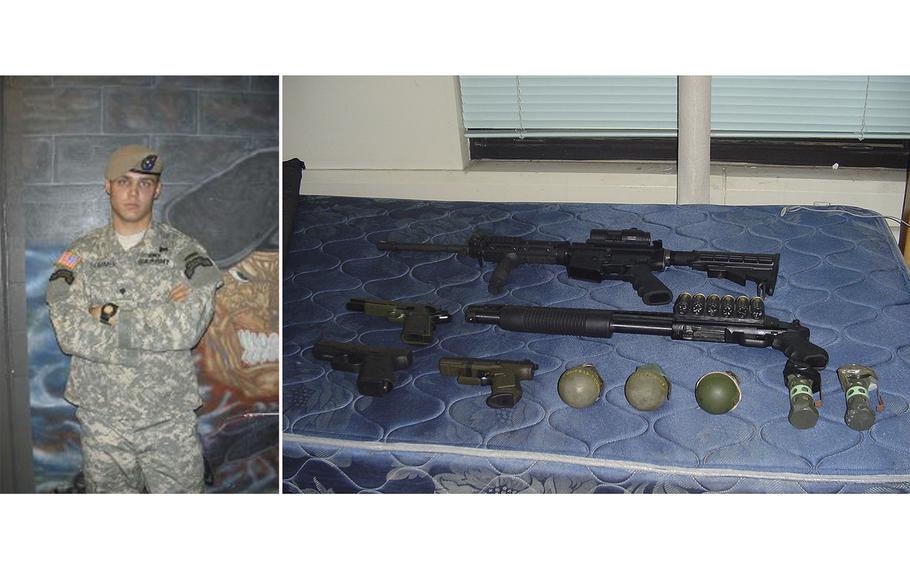
Army Ranger veteran Luke Elliott Sommer, left, and his arsenal. (WikiMedia Commons)
(Tribune News Service) — A former U.S. Army Ranger serving a 44-year prison sentence for leading a terrifying takeover robbery at a Tacoma bank, then ordering a hit on the assistant U.S. attorney who prosecuted him, has asked a judge to set him free.
Luke Elliott Sommer claims he’s a changed man after nearly 15 years in a maximum-security federal prison and that his original sentence was excessive. He’s asking U.S. District Judge James Robart to reduce his sentence to no more than 20 years, which would get him out of prison as early as 2028.
Robart is considering whether to take oral arguments on the 45-page motion, which was filed in June.
“While his conduct was extremely serious, his sentence overstates his offense conduct,” wrote Sommer, who’s representing himself. He said he was sentenced to more prison time than others convicted of similar offenses — and that the longer sentence has left him ineligible for prison programs reserved for those with earlier release dates.
He also noted that he pleaded guilty to both the bank robbery and his later attempt to have the prosecutor of his case killed.
Finally, he said newly developed brain-science research, not available when he was sentenced in 2008, shows “the average male brain does not fully develop until 25 years old” and that his behavior at age 20 was further warped by a traumatic childhood resulting in post-traumatic stress disorder and excessive alcohol and drug use.
Sommer said all of that is behind him. After years of heroin addiction — including persistent drug use while in prison — Sommer said he’s clean, sober and a respected mentor to other incarcerated people. His 45-page motion is accompanied by nearly 200 pages of documents, letters and testimonials supporting his early release, including some written by prison guards, other inmates and program managers who have overseen his incarceration and witnessed his transformation.
Moreover, Sommer argues, the COVID-19 pandemic has made prison life more punitive and difficult than anticipated by the court when he was sentenced. A dual U.S./Canadian citizen, Sommer has been incarcerated at the maximum-security Coleman II federal penitentiary in Sumterville, Fla., more than 2,500 miles from his family in British Columbia.
“Sommer’s extraordinary rehabilitation ... provides strong support for his release, decreasing his likelihood of reoffending or posing a danger to the community,” he argues in the motion, referring to himself in the third-person.
Federal prosecutors oppose his early release, arguing that the complex nature of the crime, his training as an elite soldier and his behavior after his arrest justify extensive time behind bars.
“His criminal conduct was serious, violent, and persisted over the course of years,” wrote Assistant U.S. Attorney Teal Luthy Miller of the robbery, which involved automatic weapons and hand grenades. “He led a team of armed bank robbers and possessed illegal destructive devices. Then, after he fled to Canada and was eventually extradited, he assaulted a co-defendant in prison.”
After pleading guilty to four felonies, including armed bank robbery, and receiving a 24-year sentence, Sommer tried to hire someone to kill the federal prosecutor in his case, emphasizing that he didn’t want the homicide to look like an accident.
His “hit man” turned out to be an undercover FBI agent, and Sommer got another 20 years tacked onto his prison sentence, beginning after the first two decades were served.
According to documents filed in the case, Sommer was an Army Ranger stationed at Fort Lewis when he recruited two other Rangers, Chad Palmer and Alex Blum, and Canadian nationals Tigra Robertson and Nathan Dunmall to participate in the Aug. 7, 2006, robbery of a Bank of America branch on South Tacoma Way. The robbers, some armed with AK-47s and wearing body armor, made off with $54,011.
Prosecutors said Sommer planned to use the money to establish a crime family in Canada. Sommer claimed the robbery was a political protest to draw attention to war crimes he witnessed in Iraq and Afghanistan — a claim the Army later discounted.
A bystander spotted the license plate of the robbery getaway car and reported it to police. The car was traced to Fort Lewis, where evidence of the crime was uncovered at the men’s barracks.
Sommer was arrested at his parents’ Peachland, B.C., home but disappeared after being placed on house arrest. He later was arrested in Richmond, B.C.
Blum and Palmer, who served alongside Sommer in C Company, 2nd Battalion, 75th Ranger Regiment, pleaded guilty to taking part in the robbery, as did Robertson, of Kelowna, B.C., and Dunmall, of Chilliwack, B.C.
As a Ranger — his dual citizenship enabled him to join the Army — Sommer served combat deployments in Iraq and Afghanistan. In Iraq, he said, his roommate was killed by a roadside bomb.
In Afghanistan, he said, his platoon was dispatched to recover the remains of Navy SEAL Team 10 and their rescuers, who died in a 2005 ambush and helicopter crash memorialized in the book and movie “Lone Survivor.”
“For months, Sommer had lived, eaten and trained” with the SEAL team and “Nightstalker” helicopter crews, his court motion said. “The loss of friends and acquaintances, along with his adverse childhood experiences, resulted in Sommer developing severe Post-traumatic stress disorder, which Sommer still deals with today.”
(c)2022 The Seattle Times
Visit The Seattle Times at www.seattletimes.com
Distributed by Tribune Content Agency, LLC.